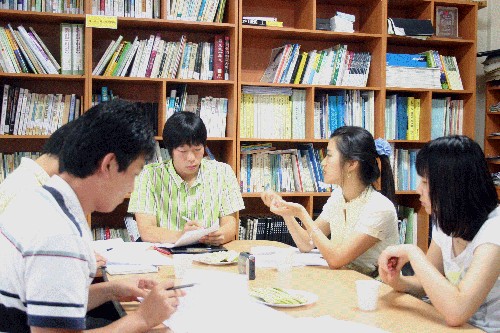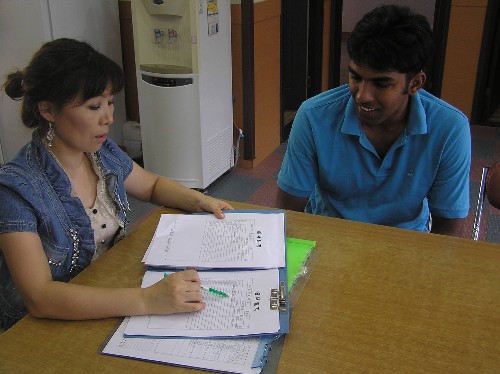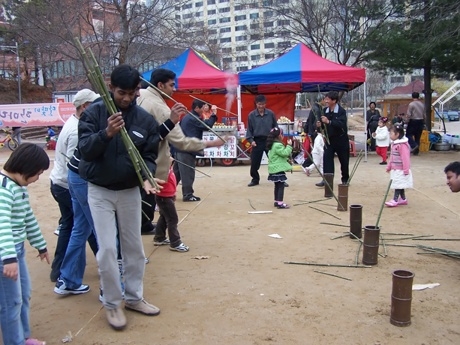A Look Back at EPSFW For the Last Three Years
Chonnam Tribune deals with the problems of the EPSFW and whether the LPSFW could be a proper solution for immigrant protection. CNU students discussed the topics on August 8: Lim Jeong-seob, the leader of a volunteer club for foreign workers, ‘Hanulltari’ in the Department of Sociology, and Gim Yeong-ung, Choi Se-jin and Oh Bang-shil, members of an academic club “Deulyeodabogi” in the Department of Law. – Ed.
Introduction
On February 11, a massive fire broke out at the Yeosu Detention Center inside the Migrant Control Office and killed ten foreign workers and injured seventeen others called ‘illegal immigrants’. Since the fire occurred, civic groups and the Labor Union for Migrant Workers insist that the ‘Employment Permit System for Foreign Workers (EPSFW)’ should be abolished or reformed. That is because the EPSFW directly caused foreign workers’ poor working conditions and their human rights were violated in the process of their arrest and detention. The Democratic Labor Party (DLP) also has been preparing legislation of a new work system, the ‘Labor Permit System for Foreign Workers (LPSFW)’.

Moderator: Before taking up the main topic, shall we talk about the working and living conditions for foreign workers in Gwangju, the city of Peace, Democracy and Human Rights.
Lim Jeong-seob: Most foreign workers live in Bonchon and Hanam Industrial Complexes and the High Tech Industrial Complex and mainly work in manufacturing industries. Their nationalities are Pakistani, Sri-Lankan, Chinese, Vietnamese, Cambodian, and others. I know they usually work overtime in comparison to Korean workers and spend their spare time with themselves. Approximately six welfare facilities and volunteer clubs currently help foreign workers and teach them Korean language.
Moderator: I know about half of the foreign workers in Gwangju cannot receive medical coverage due to high medical costs and inflexible working hours. Then, what are the problems of the EPSFW?
Gim Yeong-ung: South Korea introduced the EPSFW replacing Foreign Industrial Trainee System (FITS) in 2003 in order to prevent the sweated labor of industrial trainees and to cope with manpower shortage of small and mid-sized businesses. Since then, about 330,000 foreigners came to Korea for getting jobs. But, it is impossible for foreign workers to change workplaces without Korean employers’ agreement. Renewing an employment contact every year for three years could not ensure steady employment.
Lim Jeong-seob: In my opinion, the EPSFW is enacted to control and manage foreign workers easily. If they leave a company before their contracts ends due to poor working conditions and unreasonable wages, they become illegal immigrants.
Choi Se-jin: The Ministry of Labor in charge of supervising basic working and employment conditions for foreign workers has not performed its administrative role. As a result, many who came to Korea legitimately become illegal immigrants by violating the Immigration Control Law.
By Ki Byung-su, Student Editor
#277 Global Lounge

Moderator: It is clear that the introduction of the EPSFW enables migrantworkers legitimately to form a significant portion of Korea’s industrial manpower. However, it is necessary that the government reforms the EPSFW or establishes an effective system to fundamentally resolve the illegal immigrants issue. What do you think the government would do to reinforce crackdowns on illegal immigrants?
Gim Yeong-ung: I agree that illegal immigrants performed an important role in the workplace, the so-called 3D jobs, even though they infringed the Immigration Control Law. However, we should take into consideration the labor market situation for Korean workers. If the regulation on illegal immigrants is weakened, their number could be increased and jobs for Koreans could be decreased.
Lim Jeong-seob: The number of illegal immigrants has not decreased since August 17, 2004. We should closely examine procedures for selecting and introducing migrant workers. It takes too much time and money - off-the-books money for a public servant of the sending country - that they come to Korea through legal immigrations procedures. So, they tend to choose the shortcut of illegal entry by spending much money to illegal employment agents. As they should retrieve the investment money in one and half a year, they could not make reasonable demands for their working conditions. Moreover, if they remain here when their authorized period of stay expires, then finally become illegal immigrants.
Moderator: The DPL insists the LPSFW should be introduced as an alternative for resolving the problems of the EPSFW. Is the LPSFW a proper alternative?
Gim Yeong-ung: If the LPSFW is introduced, foreign workers could choose their workplace after entering Korea and need not renew their employment contact every year. So, the LPSFW could give them more the right to choose and then prevent them from becoming illegal workers by issuing working visas.
Choi Se-jin: However, the LPSFW may cause other problems such as their settlement in Korea and decrease in the number of jobs for Koreans. France and Germany introduced the LPSFW but failed due to additional expenses for foreign workers’ settlements and the decreasing number of jobs for the native population. That could to be a burden for Korean society.

Lim Jeong-seob: Those worries related to the LPSFW are more general for some people, but the government should establish a feasible and effective system to resolve illegal immigrant issues and ease the labor shortage in 3D jobs in which Korean workers are reluctant to work. If the government could regulate the number of immigrant workers for the Korean labor market, the LPSFW could be a more appropriate work system.
Moderator: The LPSFW has a chance to resolve the problems of the EPSFW, but cause other social ones such as a decrease in the number of Korean jobs and additional expense for foreign workers’ settlements. What is the most urgent matter in order to solve the plight of immigrant workers?
Lim Jeong-seob: I think it is to improve working conditions of foreign workers and to protect illegal immigrants, who are suffering from adamant crackdowns using gas guns, net guns, and tasers.. They could not get medical treatment and even return home due to their illegal status. To prevent a second wave of illegal immigrants, the Korean government should introduce the LPSFW and recover their legal statutes of migrant workers.
Choi Se-jin: It is a great pity that they spend their spare time with themselves because they have no opportunity to mix with Koreans. We need to provide for them more institutional facilities like a shelter for foreign immigrants.
Oh Bang-shil: I hope feasible institutional methods such a new work system and laws are established as soon as possible in order to protect their rights including the right to work and human rights as soon as possible. We need to recognize that the Korean society is becoming multinational and multicultural, even more than before.
Conclusion
Even now, many foreign workers are entering Korea to realize a Korean dream. However, many of them may suffer from unreasonable working conditions, strict regulations, harsh punishment, and discrimination or isolation from Korean society after arriving in Korea. All humans have the right to pursue happiness. However, if a particular law deprives happiness to a minority in a society, the law should be abolished or reformed. The EPSFW has deprived migrant workers’ from attaining their dreams and happiness. We should prevent migrant workers from being exploited and falling into being potential victims in a massive fire through a new and effective work system.

